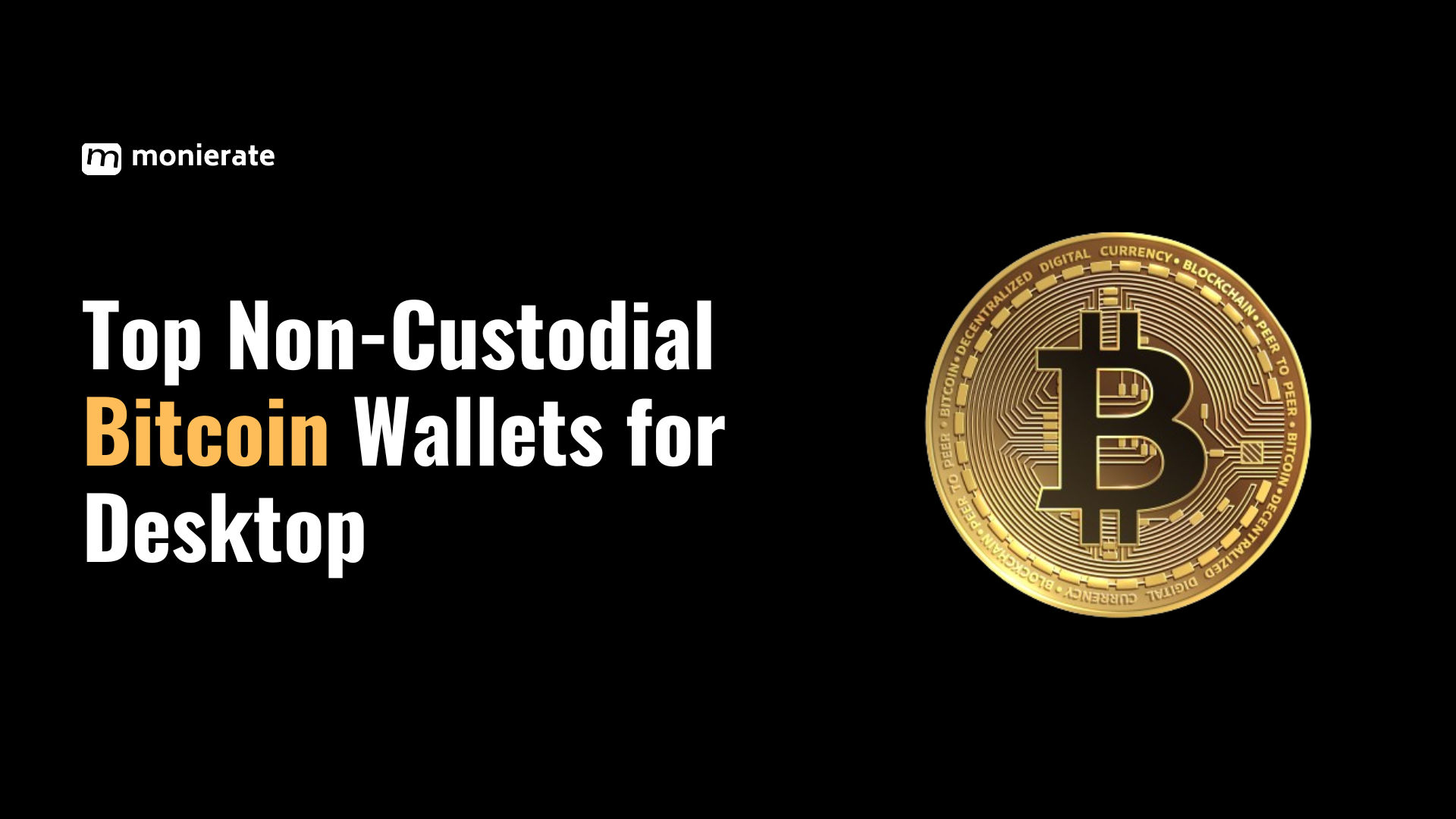
There are many non-custodial Bitcoin wallets on the market, but some are better than others. Wallet types include cold and hot wallets.
Cold wallets are hardware devices resembling USB sticks, while hot wallets can be mobile, browser-based, or desktop applications.
In this article, we focus on desktop wallets. So here are the nine best non-custodial Bitcoin wallets for managing your assets in 2024.
1. Bitcoin Core
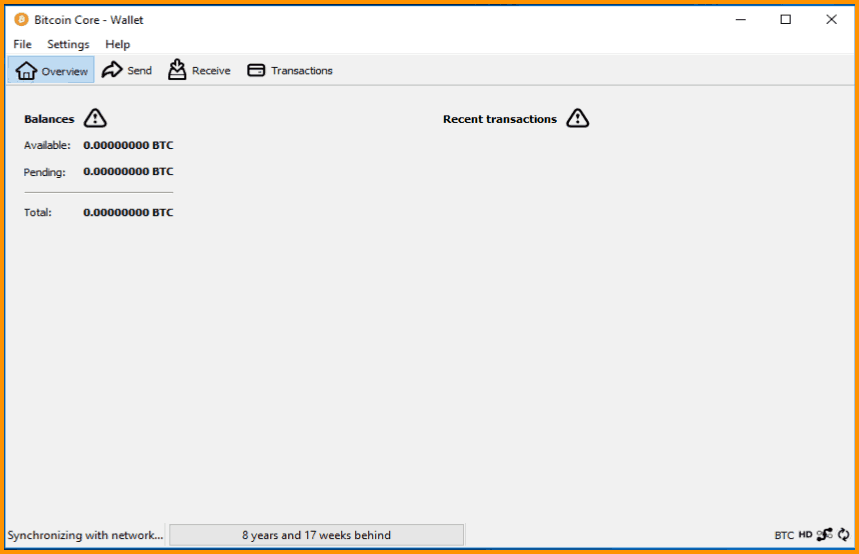
Best For: Advanced users
Supported Operating System: Windows, Mac OSX, Linux, Ubuntu, ARM Linux
Cost: Free
Segwit Enabled: Yes
Bitcoin Core is the official desktop Bitcoin wallet developed by Bitcoin core developers.
It is a full node client meaning, one needs to download the whole Bitcoin blockchain to send/receive a transaction which is a memory-intensive process.
The core acts as a full node as well as provides wallet functionality for managing Bitcoin.
Its UI is not as great but it is one of the most featured wallets, as it provides facilities such as mempool settings, Replace-by fees, child, pays for parent, etc for BTC transactions.
Features to look out for:
The wallet seamlessly integrates with Tor.
Decentralized transaction privacy compared to lightweight peer-to-peer clients.
The wallet employs an automatic key generation system, creating a tree of keys accessible through a 12- or 24-word phrase derived from the key tree.
Open Source framework
2. Bitget Wallet
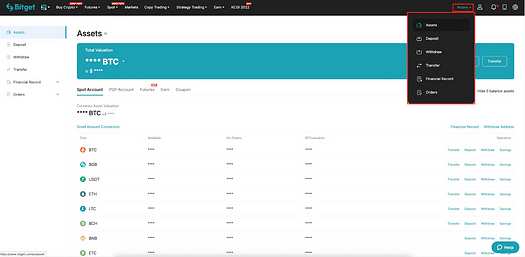
Best For: Intermediate & advanced users
Supported Operating System: Windows, Mac OSX, Linux, Android, iOS
Cost: Free
Segwit Enabled: Yes
This feature-rich option prioritizes security with multi-layered protection, including transaction checks and hardware wallet support.
Bitget offers a user-friendly interface for interacting with DeFi applications and digital assets, thanks to its built-in swap feature and extensive DApp browser.
However, like all non-custodial wallets, the onus falls on you to safeguard your recovery phrase, as Bitget cannot access your funds if you lose it.
Beyond Dapp features, Security is prioritized with 360° “GetShield” risk alerts, transaction checks, hardware wallet support, and a $300 million protection fund.
Features to look out for:
Staking
Powerful swap features and DApp access
24/7 security with multi-layered protection
Aggregates mainstream DEXs and NFT marketplaces for optimal pricing
Provides extensive educational materials
3. Copay
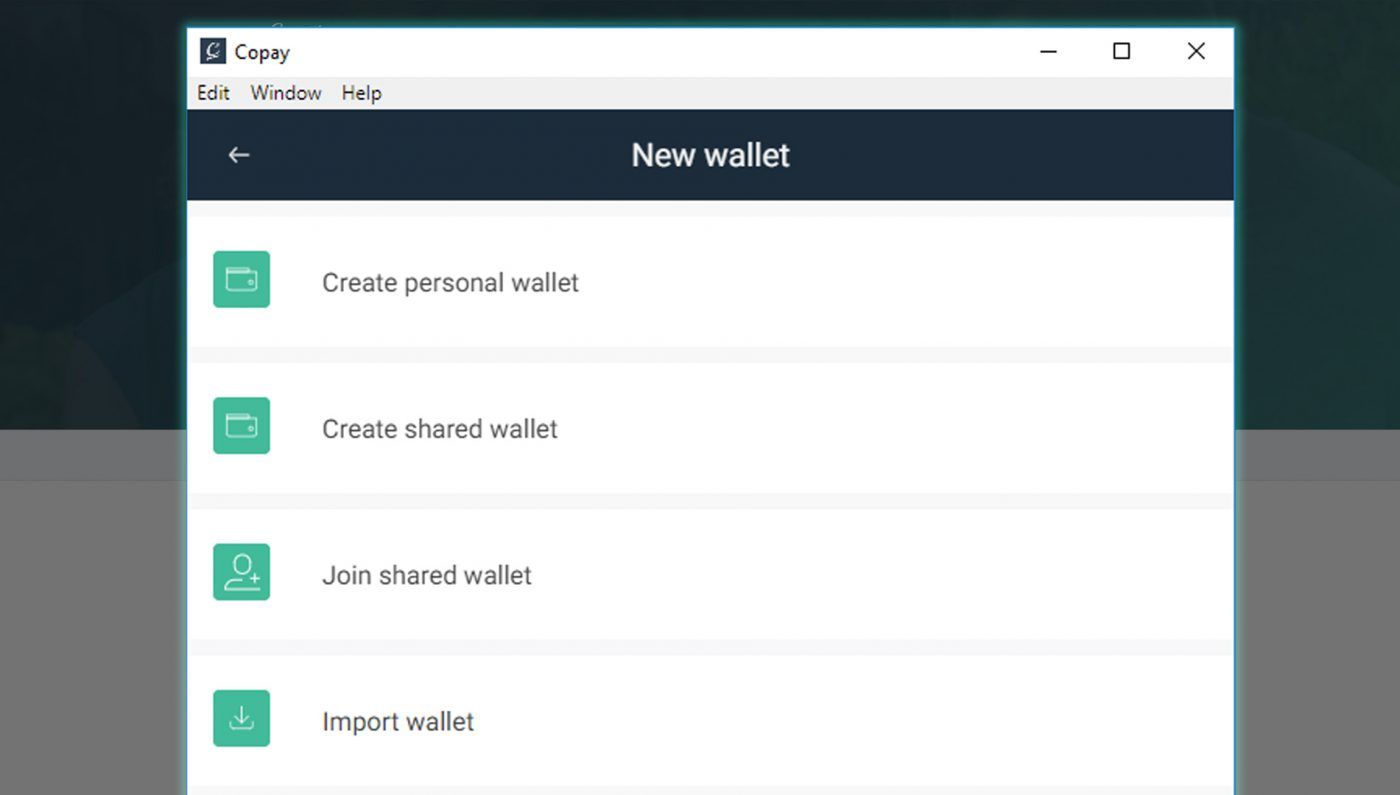
Best For: Intermediate & Advanced users
Supported Operating System: Mac OS, Linux, and Windows.
Cost: Free
Segwit Enabled: Yes
Developed by BitPay, a leading Bitcoin payment processor, Copay is a multi-signature (multisig) wallet available for desktop and mobile platforms.
This multisig feature offers enhanced security against theft, making it a good alternative for those who can’t invest in a hardware wallet.
Copay boasts open-source code with a well-established presence since 2014. Despite a potentially complex back-end for beginners, Copay provides a user-friendly interface with robust support for advanced features.
While Copay is currently limited to Bitcoin and its offshoot Bitcoin Cash, it allows you to customize transaction fees compared to the network average.
Features to look out for:
Manage multiple wallets within the same app
Supports integration with hardware wallets like Trezor and Ledger
Real-time exchange rates
Bitcoin value calculator function
Supports the Bitcoin Payment Protocol (BIP) 0070 and 0073.
4. Armory
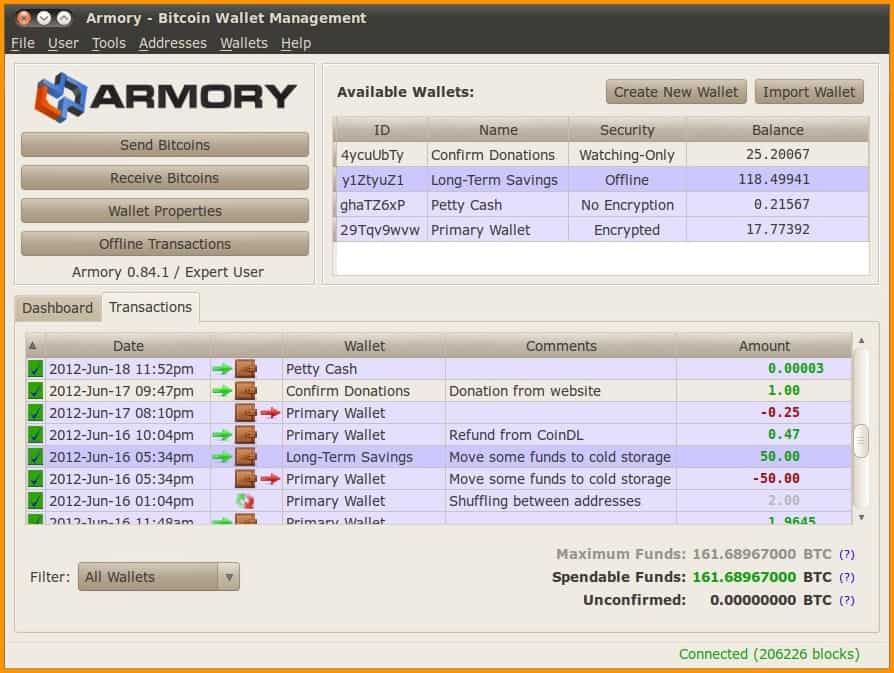
Recommended For: Advanced users
Supported Operating System: Windows, Mac OSX, Linux
Cost: Free
Segwit Enabled: Yes
Armory is another option worth exploring for Bitcoin enthusiasts. Developed by a seasoned team and built with open-source code, this wallet caters specifically to Bitcoin storage.
However, it’s a heavyweight contender. Unlike lighter wallets, Armory requires downloading the entire blockchain and setting up a full node.
This grants you a significant advantage and complete independence from third-party verification. With Armory, you can self-verify transactions and ensure the utmost security for your Bitcoin holdings.
Armory also empowers you to create secure cold storage wallets and access multisig wallets through Lockboxes, the gold standard for safeguarding large amounts of Bitcoin.
Features to look out for:
Operates as a full node
Supports secure cold storage, allowing you to store your private keys offline
Multi-Signature support for transactions
Hierarchical Deterministic (HD) Wallet
Armory includes features like encrypted backups and password-protected fund transfers
Custom fee control
5. Electrum
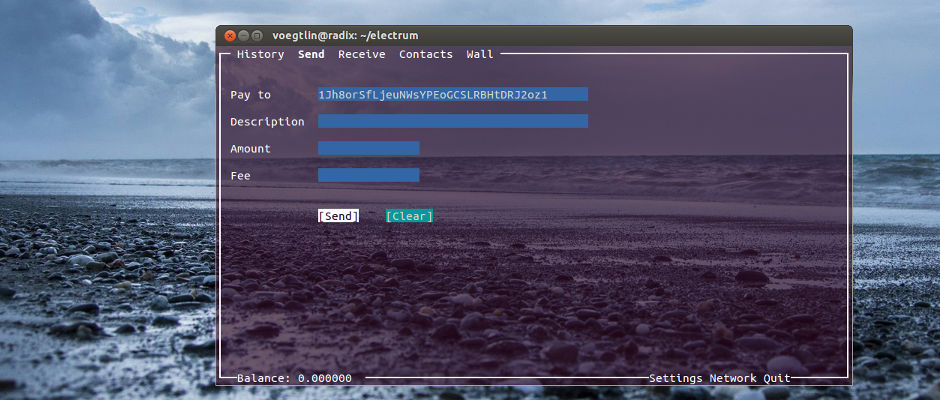
Recommended For: Intermediate & advanced users
Supported Operating System: Windows, Mac OSX, Linux
Cost: Free
Segwit Enabled: Yes
Electrum, launched in 2011, is a Bitcoin veteran known for its user-friendly interface and advanced features.
This lightweight wallet doesn’t require downloading the entire blockchain, saving on storage space.
Electrum caters to both beginners and experienced users. Beginners will appreciate the straightforward setup, while advanced users can customize transaction fees and enjoy compatibility with hardware wallets.
As a self-hosted wallet, you control your private keys, making you your own bank.
Features to look out for:
Compatible with several hardware wallets, including Ledger, Trezor, and KeepKey
The open-source nature of Electrum allows users to inspect, evaluate, and enhance its source code
Supports cold storage so users can store their seed phrases on offline devices
It integrates with the Lightning Network and offers multi-signature (multi-sig) wallet functionality
Allows you to choose between static, mempool, and ETA fees
6. Sparrow
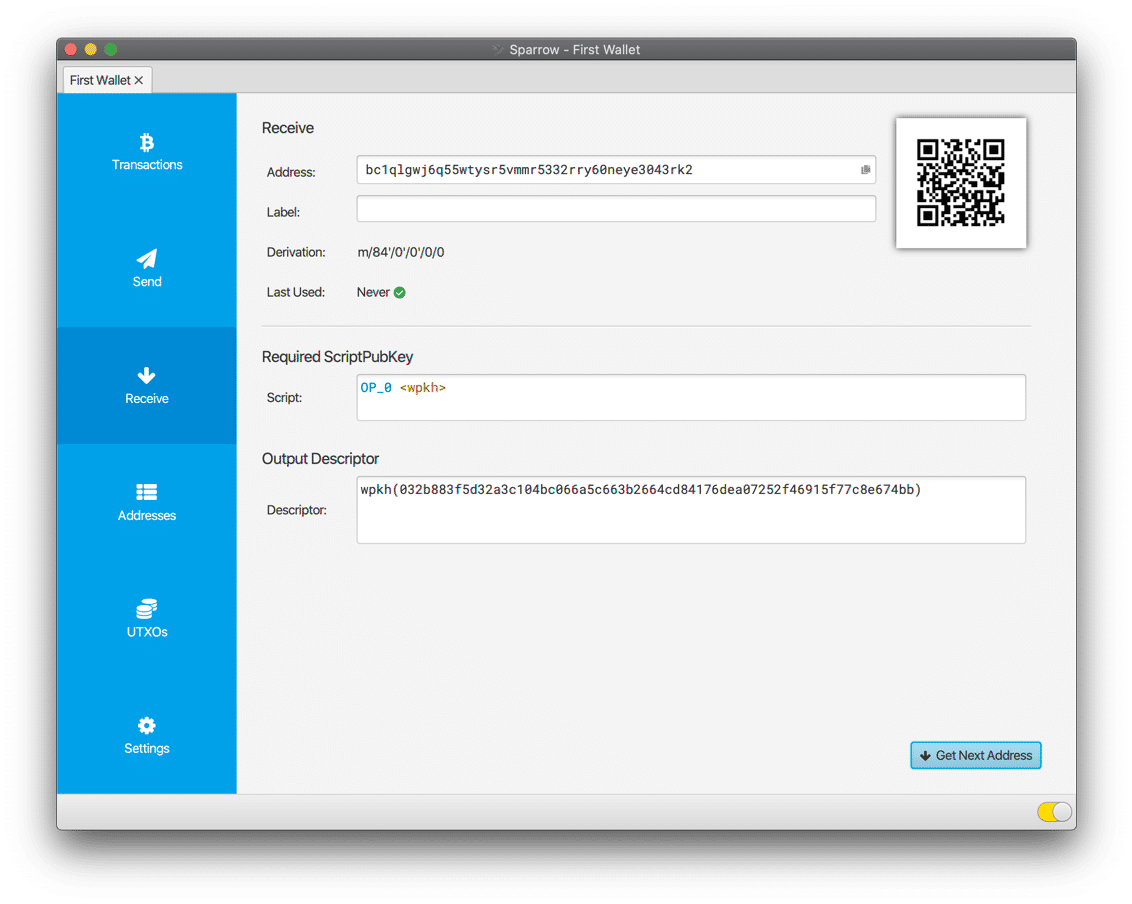
Best For: Advanced users
Supported Operating System: Windows, Mac OSX, Linux
Cost: Free
Segwit Enabled: No
Sparrow Wallet is a strong choice for those who want to manage their Bitcoin with autonomy and transparency. It seamlessly integrates with hardware or software wallets you already own, allowing for single or multi-signature setups.
Users can manage multiple wallets, customize transaction fees, and benefit from a high degree of flexibility.
Sparrow provides clear visualizations of transactions for manual verification, signing, and broadcasting. Additionally, it supports Partially Signed Bitcoin Transactions (PSBTs) for added control.
Features to look out for:
Argon2 and Tor integration
Single and Multisig Wallets
Hardware Wallet Support
Watch-Only Wallet
PSBT Support
7. Exodus
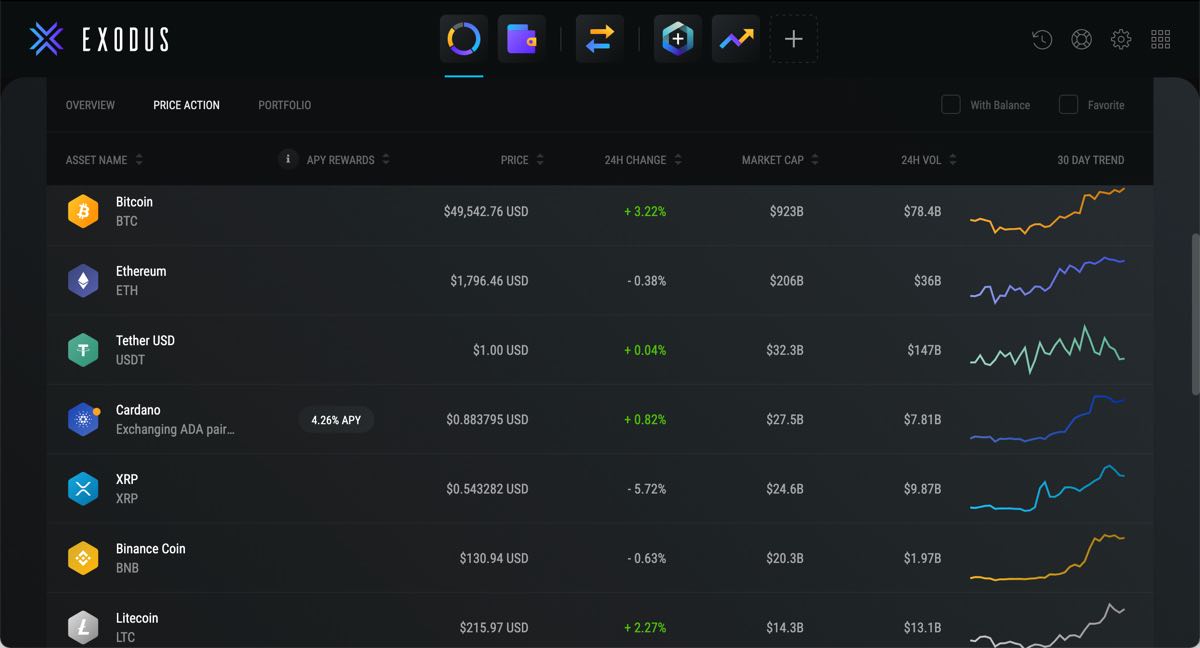
Best For: Intermediate & advanced users
Supported Operating System: Windows, Mac OSX, Linux, Android, iOS
Cost: Free
Segwit Enabled: Yes
No discussion of desktop crypto wallets is complete without mentioning Exodus. Launched in 2015, this user-friendly masterpiece stores Bitcoin and other cryptocurrencies.
This self-hosted wallet shines with its intuitive interface and requires no registration or KYC checks, putting you in complete control. To back up your seed phrase, however, you’ll need to provide an email address.
Beyond its user-friendliness, Exodus is built with advanced features like Replace-By-Fee (RBF) and custom fee control give you greater transaction control.
Exodus requires installation though on a specific device, limiting its on-the-go accessibility for some users.
Features to look out for:
Supports over 100,000 digital assets on over 50 blockchain networks
Users can stake multiple assets directly within the wallet to earn passive income
Includes a built-in NFT marketplace and gallery on Magic Eden
Allows users to connect to DApps on Ethereum, Solana, and BSC networks
8. Trezor Wallet
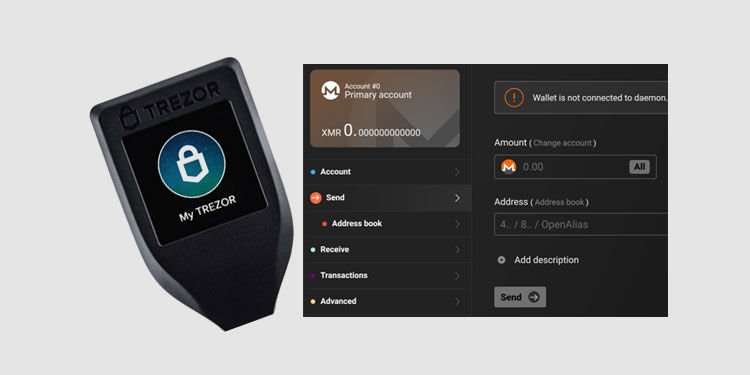
Recommended For: Immediate & Advanced users
Supported Operating System: Windows, Mac OSX, Linux
Cost: The Trezor Suite software is free, but the Trezor One hardware wallet itself is not
Segwit Enabled: Yes
With a non-custodial Trezor wallet, you hold the keys literally! No registration or KYC checks are required, giving you complete control over your Bitcoin.
The Trezor devices offer built-in exchange functionality and integration with various third-party wallets.
While the Suite companion app provides a user-friendly interface for managing Bitcoin and includes advanced options like CoinJoin and automated purchases.
The budget-friendly Model One and the touchscreen Model T are both designed for ease of use.
Features to look out for:
Two-factor authentication and multisignature support
Integrates with Tor for anonymised transactions
Features a watch-only wallet to monitor your funds without exposing your private keys.
Built-in exchange feature
9. Coinomi
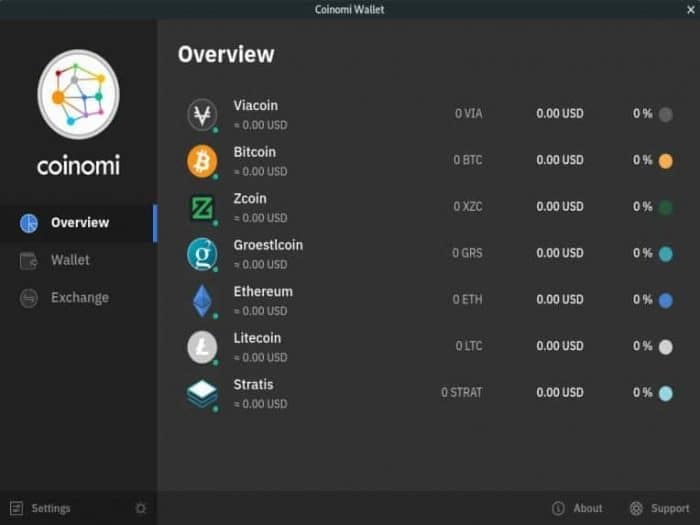
Recommended For: Beginner, Immediate & Advanced users
Supported Operating System: Windows, Mac OS, Linux
Cost: Free
Segwit Enabled: Yes
Coinomi is one of the first and most trusted non-custodial desktop bitcoin multiwallets. Supporting over 125 blockchains and all Ethereum tokens, Coinomi offers great exchange rates without extra fees.
Through a partnership with Simplex, you can buy bitcoin directly in the app with a credit or debit card.
Privacy is a top priority: Coinomi hides your IP address when pushing transactions to the blockchain, ensuring anonymity.
Other enhanced security features like an optional pin, password, or biometric lock keep your funds protected.
Features to look out for:
Hierarchical Deterministic Wallet (BIP44) logic
Binance DEX and Changelly Integration
High Anonymity
Full ERC20 compatibility
Sweeping private key
Buy with Fiat
Calisto Cold Staking
Conclusion
Desktop wallets offer significant advantages, including:
Less Risk of Loss or Theft: Laptop and desktop computers are less likely to be stolen or lost in public places than mobile devices.
Multi-Platform Support: Desktop wallets often work on Windows, macOS, and Linux, offering flexibility.
Offline Transactions: Desktop wallets can support offline transactions, enhancing security by minimizing online exposure.
However, they come with some drawbacks:
Limited Portability: Desktop wallets are tied to a specific computer, limiting access when away.
Technical Complexity: Desktop wallets require more technical knowledge, posing challenges for novice users.
Security Risks: Despite enhanced security, desktop wallets are still vulnerable to malware, keyloggers, and hacking.
Potential Hardware Compatibility Issues: Some desktop wallets may have specific hardware requirements or limitations.
By understanding these benefits and limitations, you can make an informed decision about using non-custodial Bitcoin wallets on your desktop device.
FAQs - Desktop Wallets
Q: How often should I update my desktop wallet?
A: You should update your desktop wallet whenever a new update is available. Regular updates ensure the latest security enhancements and bug fixes.
Q: Are desktop wallets safe?
A: Yes, desktop wallets are generally safe and secure. They offer strong encryption and multisig support to protect your assets. However, their safety also depends on the security of your computer and your practices.
Q: What is a desktop wallet?
A: A desktop wallet is a software application installed on your computer. It allows you to store, manage, and transact cryptocurrencies securely.
Q: What does Seg-wit mean?
A: SegWit (Segregated Witness) is a Bitcoin upgrade that separates transaction signatures from the main data to make transactions faster and cheaper.
Q: Which desktop app is the most reliable wallet?
A: The most reliable wallet can vary based on individual preferences. Electrum and Exodus are widely recognized for their reliability and security features.
Q: What is the most secure hardware wallet?
A: The Ledger Nano X is often considered the most secure hardware wallet. It provides advanced security features.
Q: Are hardware wallets 100% safe?
A: No, hardware wallets are not 100% safe, but they are generaly regarded as extremely secure. They can still be vulnerable to physical theft or user errors. Proper usage and precautions can minimize risks.
Conclusion
Desktop wallets offer significant advantages, including:
Less Risk of Loss or Theft: Laptop and desktop computers are less likely to be stolen or lost in public places than mobile devices.
Multi-Platform Support: Desktop wallets often work on Windows, macOS, and Linux, offering flexibility.
Offline Transactions: Desktop wallets can support offline transactions, enhancing security by minimizing online exposure.
However, they come with some drawbacks:
Limited Portability: Desktop wallets are tied to a specific computer, limiting access when away.
Technical Complexity: Desktop wallets require more technical knowledge, posing challenges for novice users.
Security Risks: Despite enhanced security, desktop wallets are still vulnerable to malware, keyloggers, and hacking.
Potential Hardware Compatibility Issues: Some desktop wallets may have specific hardware requirements or limitations.
By understanding these benefits and limitations, you can make an informed decision about using non-custodial Bitcoin wallets on your desktop device.
